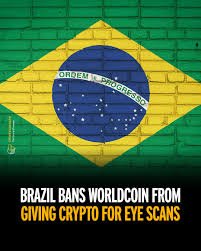Brazil’s Supreme Court Dismisses Habeas Corpus Case, But Reports Suggest Worldcoin Continues Operations in São Paulo

Despite a regulatory ban, Worldcoin (WLD) and its operator, Tools for Humanity, are reportedly continuing to operate in São Paulo, Brazil, collecting biometric data in exchange for cryptocurrency. While the company has avoided legal consequences in the form of a Habeas Corpus lawsuit, concerns over ethical and regulatory violations persist.
A recent report from G1, the digital arm of O Globo newspaper, indicates that Worldcoin may be defying an order from Brazil’s National Data Protection Authority (ANPD), which prohibits financial incentives for biometric data collection. The controversy highlights the growing tension between emerging blockchain-based identity projects and government regulators, particularly in regions with less established frameworks for biometric data protection.
Is Worldcoin Defying Brazil’s Ban?
Despite Brazil’s regulatory prohibition, reports suggest that Worldcoin’s biometric data collection activities are continuing in São Paulo. G1 journalists visited multiple Worldcoin service centers and confirmed that people are still being offered cryptocurrency in exchange for registering their biometric data.
G1’s investigation revealed the following:
- Journalists visited three of the 52 Worldcoin service centers in São Paulo.
- 12 individuals who had recently registered confirmed that they were still promised WLD tokens upon scanning their irises.
- Although the service centers were not crowded, operations appeared to continue as usual, with no visible disruptions due to regulatory actions.
One Worldcoin employee, who spoke anonymously, stated that no internal guidance had been given regarding a suspension of payments. This raises questions about whether Tools for Humanity is actively disregarding Brazil’s data protection laws or if the company believes it is operating within a legal gray area.
Additionally, G1 noted that many of these centers are located on the outskirts of São Paulo, possibly suggesting an effort to target lower-income populations. Critics argue that this could raise ethical concerns over the exploitation of vulnerable individuals who might be more inclined to exchange their biometric data for financial incentives.

Regulatory Risks and Potential Consequences
Brazil’s National Data Protection Authority (ANPD) has taken a firm stance against Worldcoin’s operations, warning that noncompliance will be considered an aggravating factor in any future enforcement actions. The agency’s primary concerns include:
- Coercion and Consent: By offering financial incentives, Worldcoin’s model may distort individuals’ ability to provide fully informed consent when sharing their biometric data.
- Privacy Risks: The collection and storage of highly sensitive biometric data, such as iris scans, introduce serious privacy and security risks, particularly if such data is mishandled or falls into the wrong hands.
- Regulatory Defiance: If Worldcoin continues its operations despite the ANPD’s order, the company could face fines, forced shutdowns, or potential criminal liability.
However, Worldcoin maintains that it is operating legally and is working with ANPD to resolve compliance issues. The company has not provided a clear response on whether it intends to suspend payments in Brazil.
Habeas Corpus Case Dismissed, But Privacy Concerns Persist
Amid these controversies, a Brazilian citizen named Joaquim (surname withheld) attempted to escalate the issue to the country’s Superior Court of Justice (STJ) by filing a Habeas Corpus petition on behalf of 150,000 individuals who had already registered their biometric data with Worldcoin.
Joaquim’s petition made several key arguments:
- He requested an emergency injunction to protect Brazilians who had already provided their biometric data.
- He alleged that paying individuals in crypto for their iris scans constituted a form of coercion, violating the principle of free and informed consent.
- He demanded the immediate suspension of Worldcoin’s data collection efforts and requested that all previously collected biometric data be either returned to its rightful owners or destroyed.
However, the STJ, under the leadership of Minister and President Herman Benjamin, dismissed the case, ruling that the Habeas Corpus legal framework does not apply to data privacy issues.

Legal Expert: Habeas Corpus Not Applicable in Worldcoin’s Case
Criminal lawyer Lucas Schirmer de Souza provided insight into the dismissal, explaining that Habeas Corpus protections are designed to safeguard an individual’s freedom of movement from unlawful detention or coercion.
“Habeas Corpus is a constitutional guarantee meant to protect individuals from illegal imprisonment or restriction of movement,” de Souza clarified. “It does not apply in cases concerning data privacy or consent to data collection.”
This legal interpretation suggests that any future legal challenges to Worldcoin’s operations in Brazil would need to rely on data protection laws rather than constitutional rights frameworks.
Worldcoin’s Global Privacy Challenges
The situation in Brazil is not unique. Worldcoin has faced similar regulatory scrutiny in Argentina and other countries, with governments questioning whether the company’s biometric data collection model aligns with national privacy laws.
Despite its global expansion, Worldcoin remains controversial, with concerns that its approach could:
- Set a dangerous precedent for monetizing personal data, particularly in underregulated regions.
- Enable mass biometric surveillance if governments or corporations gain access to collected data.
- Fail to provide adequate safeguards for individuals who may not fully understand the long-term risks of sharing their biometric information.
Tools for Humanity, co-founded by OpenAI CEO Sam Altman, continues to defend its operations, arguing that its identity verification technology serves a legitimate purpose in the decentralized digital economy. However, regulatory bodies across multiple jurisdictions are increasingly scrutinizing its practices, signaling potential future legal battles.

Looking Ahead: Will Brazil Enforce Its Ban?
With the STJ dismissing the Habeas Corpus case, the immediate legal threat to Worldcoin in Brazil has subsided. However, the company still faces pressure from the ANPD, which has signaled its intent to take further action if compliance is not achieved.
Key questions remain:
- Will Brazil escalate enforcement efforts against Worldcoin, potentially imposing fines or shutting down operations?
- Will Worldcoin adjust its business model to align with Brazil’s data protection laws, or will it continue operating in defiance of regulatory orders?
- Could other countries follow Brazil’s lead, imposing stricter controls on biometric data collection for financial incentives?
As governments around the world grapple with the ethical and legal implications of biometric data collection, Worldcoin’s actions in Brazil could set an important precedent for the future of digital identity verification in the blockchain space.
For now, Worldcoin’s continued presence in São Paulo—despite regulatory pushback—suggests that the debate over privacy, consent, and financial incentives in biometric data collection is far from over.
Worldcoin è una criptomoneta che non conosco bene, ma mi inyeressa il fatto che sia un progetto ideato da chi ha creato ChatGPT. Prima o poi daró un’occhiata per bene alla crypto Worldcoin. !PIZZA
Ciao Stefano! Ho scritto anche altri articoli su Worldcoin, asserendo che viola la persona in se', oltre alla privacy: in pratica "regalano" token in cambio della scansione oculare.
A te le conclusioni ...
Ummm caspita che brutta roba!!
$PIZZA slices delivered:
@stefano.massari(2/5) tipped @mikezillo